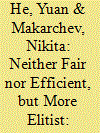|
|
|
Sort Order |
|
|
|
Items / Page
|
|
|
|
|
|
|
| Srl | Item |
| 1 |
ID:
163667


|
|
|
|
|
| Summary/Abstract |
This paper examines the concept and practice of meritocracy in Chinese national oil corporations’ (NOCs) graduate recruitment and selection. It focuses on the post-2008 NOC reform period, which sees NOCs place increasing rhetorical emphasis on meritocratic or ‘fair’ recruitment and selection. However, this paper argues that, in practice, these sentiments remain unrealized. The NOCs continue to use some sub-optimum applicant assessment measures and misuse or misunderstand the more optimum ones. Likewise, the prioritization of certain criteria, such as elite education, has merely advantaged graduates with strong Bourdieu capitals. Hence, this produces a flawed meritocracy that neither maximizes fairness nor efficiency, but strengthens elitism. Moreover, its capacity to serve political interests is questionable too. These insights, then, enhance existing academic debates over China’s engagement with meritocracy.
|
|
|
|
|
|
|
|
|
|
|
|
|
|
|
|
| 2 |
ID:
187924


|
|
|
|
|
| Summary/Abstract |
In recent years, the relationship between China’s Communist Party (CCP) and its state-owned enterprises (SOEs) has tightened. However, the impact this has had on SOE international subsidiaries remains unclear, especially vis-à-vis human resource management (HRM). This article examines recruitment and selection in Western subsidiaries of China’s largest SOEs: national oil companies (NOCs). It does so with particular attention to the experience of Chinese and Western talent. Such issues are important as scholarship increasingly suggests government involvement in SOEs serves to enhance their meritocratic, market-led conduct. However, this article argues tightening CCP-SOE subsidiary relations have neither delivered nor pursued such an end. Instead, they have carried a more opportunistic-political impetus that is: undervaluing competencies outside Party loyalty, prioritizing CCP-loyal SOE cadre development, and favoring Party or SOE-insiders. Consequently, this has weakened the subsidiaries’ business orientations and HRM practices. These insights, then, help advance understandings of political over-embeddedness within the present Chinese SOE context.
|
|
|
|
|
|
|
|
|
|
|
|
|
|
|
|
|
|
|
|
|